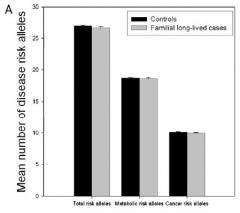October 5, 2010 report
Genetics may not help you live to old age

(PhysOrg.com) -- Most people living to over 90 have avoided the three major causes of death: heart disease, cancers, and type 2 diabetes. Several areas on the human genome have been identified as being implicated in elevated risks of these major killers, but new research has surprisingly found that older people do not necessarily have fewer genetic risk factors for them.
Several studies have suggested people living into their 90s and beyond should have a lower genetic risk that helps them avoid the three major causes of death, and several have also shown that siblings and offspring of those living past 90 also have a reduced incidence of these conditions.
The new research, led by Marian Beekman of the Leiden University Medical Center in The Netherlands, used a Genome-Wide Association Study (GWAS) to investigate this issue. GWASs scan the genome of a large number of individuals with the condition in question and non-affected controls to check for variations in the DNA common to the different groups. If the population being studied is large enough, areas of the genome associated with higher risk can be identified, even if the risk is quite small.
The study looked at 30 differences in 22 genes, all of which have been the subject of extensive testing. The first cohort consisted of sibling pairs who had both survived into their 90s, while the second comprised singletons who had lived beyond 85 years. The results for the two groups were then compared with almost 2,000 unrelated controls to determine if the genes associated with disease risk were present in greater numbers in the controls (representing the general population) than in the elderly.
The results were surprising in that the number of disease risk alleles was almost identical, with 26.7 ± 0.19 in the 90-year-old sibling group and 27.0 ± 0.12 in their control group,, and 26.8 ± 0.11 in the 85+ group and 26.8 ± 0.10 in their controls. The results were also almost identical in various subsets of genes, if the diseases were considered separately or together, and the same rate was found even in subjects with high risk for the diseases.
The authors of the paper, published in the Proceedings of the National Academy of Sciences (PNAS) in the US, conclude that the effect of the risk alleles for the three biggest killers did not affect population survival, despite a pronounced effect being expected.
It is possible the genes being examined are not really risk factors, but the researchers suggest another possibility is that the elderly, while not having a particularly low number of risk genes, may have a high number of protective genes that have not yet been identified.
A GWAS to look for areas of the genome found consistently in elderly people could identify protective alleles. Such as study has been done, but controls and samples were treated differently, and therefore the work has been criticized and should be repeated using the same DNA chips for all controls and samples.
While the new study does not reveal any useful genetic information, the risk of dying from one of three killers can often be reduced through diet and lifestyle choices.
More information: Genome-wide association study (GWAS)-identified disease risk alleles do not compromise human longevity, Marian Beekmana, et al., Proceedings of the National Academy of Sciences Published online before print October 4, 2010, doi:10.1073/pnas.1003540107
© 2010 PhysOrg.com















